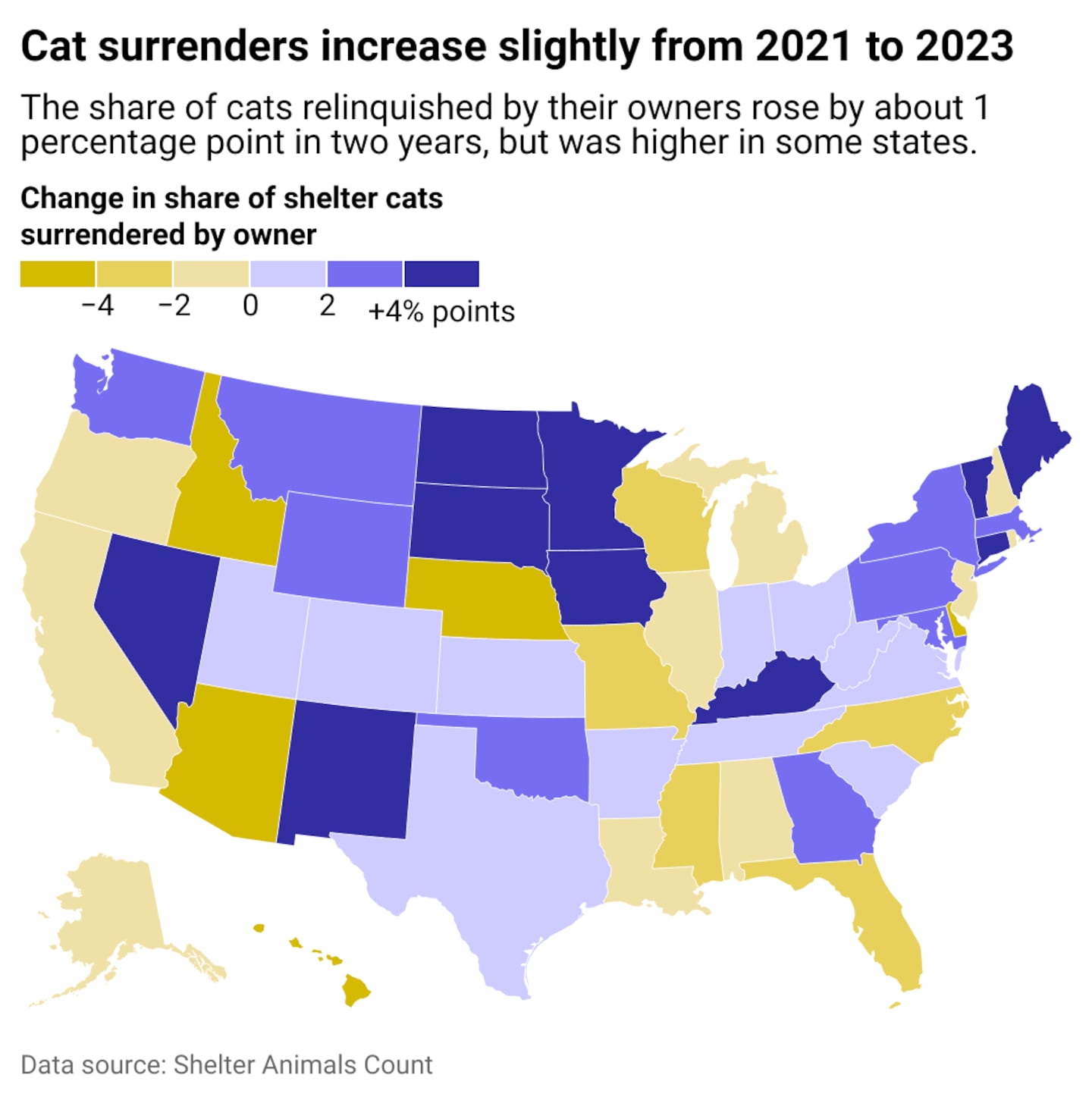The year has started fairly positively for the shelters and rescue facilities caring for homeless kitties. In most parts of the country, shelters recorded notably lower rates of cat surrenders in 2024 than in 2023 and 2022, with around 340,000 cats surrendered to shelters by December of last year, according to Shelter Animals Count's intake database.
This news comes in the wake of a significant uptick in pet ownership. Widespread coverage about the COVID-19 pandemic pet boom suggested that more people making a furry addition to their households was one silver lining of lockdowns. Roughly 1 in 5 households, approximately 23 million households, added a cat or dog since the pandemic began, according to 2021 data from ASPCA. Despite the decrease in surrenders in 2024, many of those pandemic pets might not have found their forever home.
While there's no easy answer to why adoption rates went down and surrender rates rose, a few significant factors come into play. As social distancing restrictions eased, economic conditions shifted, and inflation rates reached their highest point since the early 1980s, adoption rates slowed, and many shelters suddenly found themselves in a bad way.
Pets come with important responsibilities, including financial ones. Most cat owners spend around $1,149 per year on their feline friends, according to the ASPCA. These annual costs, coupled with the rise in rent-burdened households and the decline in purchasing power for many Americans, may have led some pet owners to reconsider their decision to adopt a fur baby during the pandemic.
There's no solid data on the number of people who rehoused or surrendered pets for financial reasons, but one factor is that some people had to move into homes that did not allow pets. Some animal shelters across the U.S. have even needed to stop accepting surrenders periodically because they were at capacity.
But regardless of whether COVID-19 spiked pet adoption rates or surrenders, the number of pets surrendered this past year seems to be on the decline. Meowtel analyzed data from Shelter Animals Count's Intake and Outcome Database to see how the share of cat surrenders changed in each state from 2021 to 2023.
Meowtel
Cat surrenders vary across the United States
In some states, high surrender rates correlated with unemployment and poverty rates. For example, Nevada had the highest unemployment rate in the country at 5.4% during the third quarter of 2024. The surrender rate in the Silver State rose 5.8% between 2021 and 2023, making it one of the highest in the nation. New Mexico also had a higher unemployment rate during this same period than many other states, at 3.7%, and had a 5.6% surrender rate. Both New Mexico and Nevada also had a fairly high ratio of people living below the poverty line.
North Dakota and South Dakota both have exceedingly high cat surrender rates, at 17.6% and 15.5%, respectively. Although the Dakotas also have plummeting employment rates, the increase in surrenders may be due to multiple factors. The Animal Legal Defense Fund ranked North Dakota as the worst state for animal protection laws, according to the 2023 U.S. State Animal Protection Laws Ranking Report. The uptick in surrendered animals could also be due to a "COVID-19 kickback," with people who adopted pets during the pandemic now unable to care for their companions, according to the Central Dakota Humane Society.
The surge in pet intakes in South Dakota shelters could be due to "a mix of overpopulation of animals from breeders in 2020 when demand for pets was high, and a higher number of surrenders due to rising costs to care for pets," Rescue Network's South Dakota events coordinator, Lexa Rahn, told Dakota News Now.
Wanwajee Weeraphukdee // Shutterstock
What to do when you can't care for your cat
Those in the unfortunate situation of needing to surrender a pet may feel shame, but it is often the last resort. Still, it's almost always an incredibly painful decision. Anyone who has ever dealt with the death of a family pet knows it's a devastating loss; surrendering a living pet can be just as difficult.
Those who need to surrender or rehome a furry friend should start the process as early as possible, as it can take weeks or more to find the right placement. Having them spayed or neutered and up-to-date on vaccinations is also beneficial.
For help with rehoming, spread the word with family and friends or on local community boards, and consider using the Adopt-A-Pet rehoming tool to find a new family for a pet.
If surrendering a pet is the only option, contact the nearest Humane Society, ASPCA, or animal shelter and ask them how to initiate the process. Some shelters have begun requiring surrender appointments. Book in advance, and be sure to bring vaccination records and any other important health information. Note that while some facilities may require a surrender fee to help cover the initial costs of intake, you can almost always find a group, typically a local Humane Society chapter, willing to take your pet free of charge.
Story editing by Alizah Salario. Additional editing by Elisa Huang. Copy editing by Kristen Wegrzyn. Photo selection by Ania Antecka.
This story originally appeared on Meowtel and was produced and distributed in partnership with Stacker Studio.







